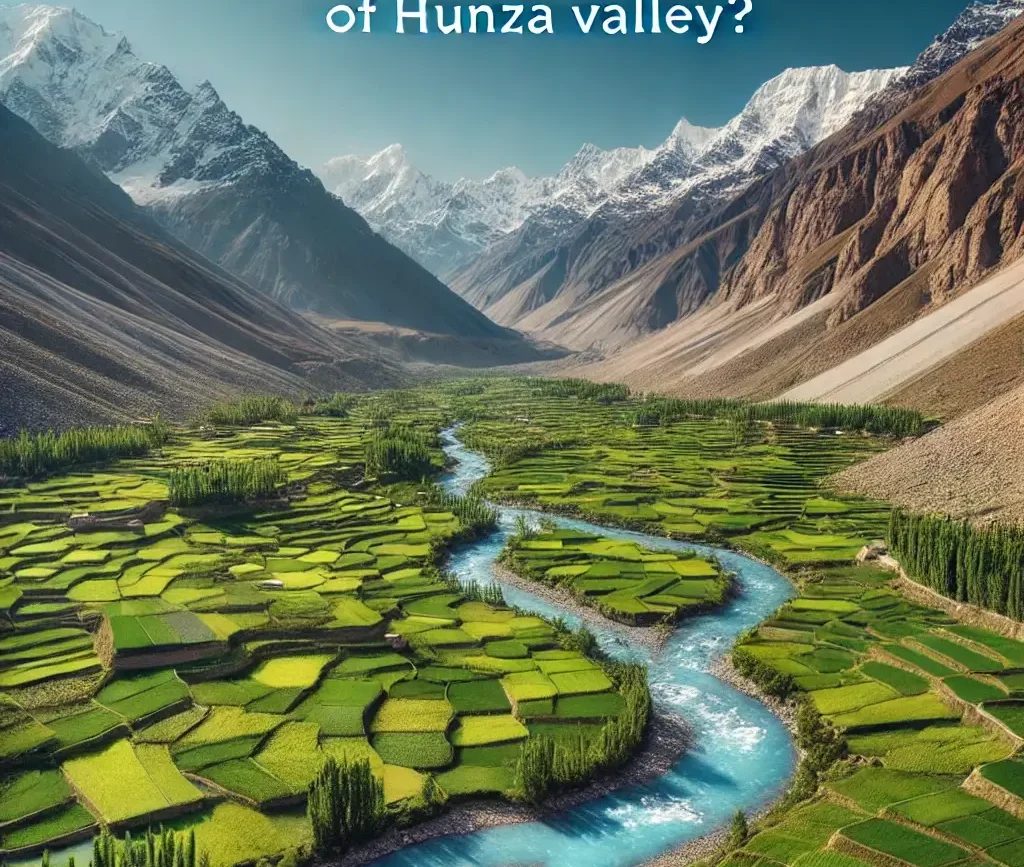Nestled amidst the towering peaks of the Karakoram, the Hunza Valley in northern Pakistan enchants travelers with its breathtaking landscapes and rich cultural tapestry. The favorite part of the valley for many is the breathtaking view of Rakaposhi from Karimabad, offering a serene and awe-inspiring panorama that captivates all who visit. This region is not just about natural beauty; it’s also steeped in history, with the ancient Altit and Baltit Forts standing as proud guardians of its storied past.

Upper, Central, and Lower Hunza each boast their own unique attractions, drawing explorers eager to experience everything from verdant terraced fields to traditional mountain life. The picturesque scenery is complemented by the warmth and hospitality of the local people, making it a memorable destination.
Visitors often find themselves charmed by the valley’s allure, whether through the vibrant blossoms of spring or the allure of trekking adventures. Hunza Valley promises an unforgettable journey into a realm where nature and culture thrive in harmony.
Exploring Hunza Valley’s Natural Beauty

Hunza Valley, nestled in the majestic Himalayas, captivates visitors with its awe-inspiring landscapes. Key highlights include the stunning Passu Cones and the tranquil Attabad Lake, both offering unique experiences for travelers.
Majestic Mountains and the Passu Cones
The towering Passu Cones, also known as the Passu Cathedral, are one of Hunza Valley’s most iconic features. These sharp, pointed peaks rise dramatically, forming an unforgettable skyline. Located in the northern part of the valley, the cones are visually striking and a must-see for any traveler.
Hiking is a popular activity around this area. Trails offer breathtaking views and allow visitors to immerse themselves in the natural beauty. The nearby village of Passu provides a simple base for exploration, where tourists can experience local hospitality and culture. Photography enthusiasts are particularly drawn to this location, as the distinct shape of the Passu Cones and their majestic presence are unmatched.
Serene Waters of Attabad Lake
Attabad Lake, formed due to a landslide in 2010, is known for its surreal turquoise waters. Located in the Hunza Valley, it spans about 21 kilometers, making it a significant attraction for those visiting the region. The scenic beauty of the lake, framed by rugged mountains, offers a perfect setting for peaceful reflection and relaxation.
Boating in Attabad Lake is a favorite pastime, where visitors can truly appreciate the site’s tranquility. The lake’s formation is a testament to nature’s unpredictable power and beauty. Its surroundings also offer opportunities for adventure, such as jet skiing and kayaking, providing an exhilarating way to enjoy the breathtaking vistas of the Hunza Valley.
Discovering Cultural and Historical Gems

Hunza Valley is renowned for its cultural and historical treasures, offering breathtaking views coupled with rich heritage and vibrant traditions. Key highlights include the ancient forts, bustling towns, and areas that showcase a blend of tradition and modern growth.
Historical Forts: Baltit and Altit
Dating back to over 700 years, the Baltit Fort is an iconic structure in the region, reflecting Tibetan architectural influences. Positioned above Karimabad, it provides panoramic views of the valley. This fort has evolved over the centuries, influenced by various rulers, including the Mirs of Hunza, combining defense with residential purposes.
Nestled a few kilometers from Baltit, Altit Fort predates its counterpart and is considered one of the oldest monuments in Gilgit-Baltistan. Built as a strategic stronghold, it stands on a cliff overlooking Hunza River. Its restoration has preserved it as a cultural museum, showcasing traditional Hunza lifestyle through artifacts and guided tours. Together, these forts narrate tales of perseverance and grandeur from Hunza’s past.
Karimabad: The Heart of Hunza
Karimabad, the vibrant heart of Hunza Valley, captivates visitors with its lively bazaars and cultural sites. Historically known as Baltit, this town serves as a cultural hub and gateway to Hunza’s historic and natural attractions.
The city is famed for its scenic views and serves as the base for trekking expeditions. The nearby Eagle’s Nest offers stunning sunset vistas and is a short drive from the town center. Travelers frequently explore the vibrant local market, buying handwoven textiles and locally crafted jewelry. Karimabad is also an ideal spot for learning about local music and indigenous dance, immersing travelers in the region’s traditions.
Gojal and Upper Hunza: A Blend of Tradition and Growth
Gojal, part of Upper Hunza, exudes a unique charm characterized by traditional culture and a landscape dotted with lush green terraces and towering peaks. This region has evolved, balancing traditional practices with modern influences, indicative of Hunza’s overall growth.
Settlements here include villages like Sost, serving as gateways to China’s Xinjiang. The Wakhi people add to the cultural diversity with their unique language and customs. Upper Hunza also boasts destinations like Passu Cones, renowned for their striking natural beauty. Travelers exploring Gojal are treated to the blend of vibrant cultural life and evolving growth, fostering a microcosm of Hunza’s rich heritage.
